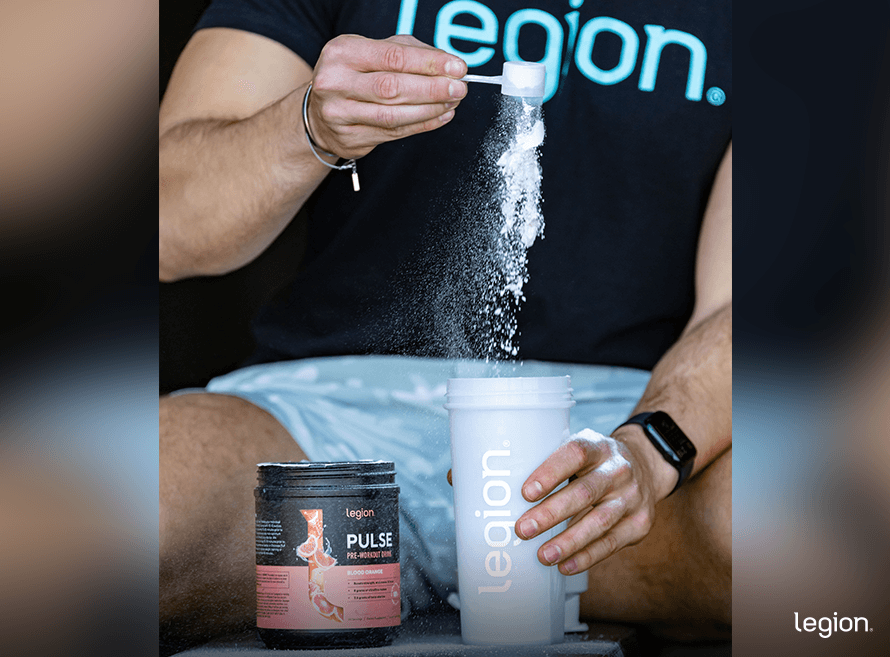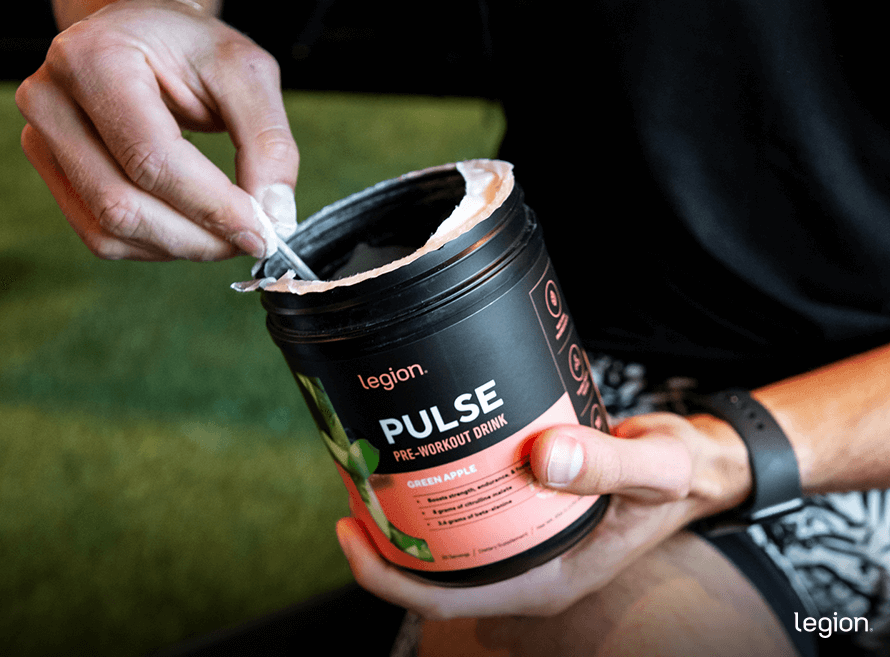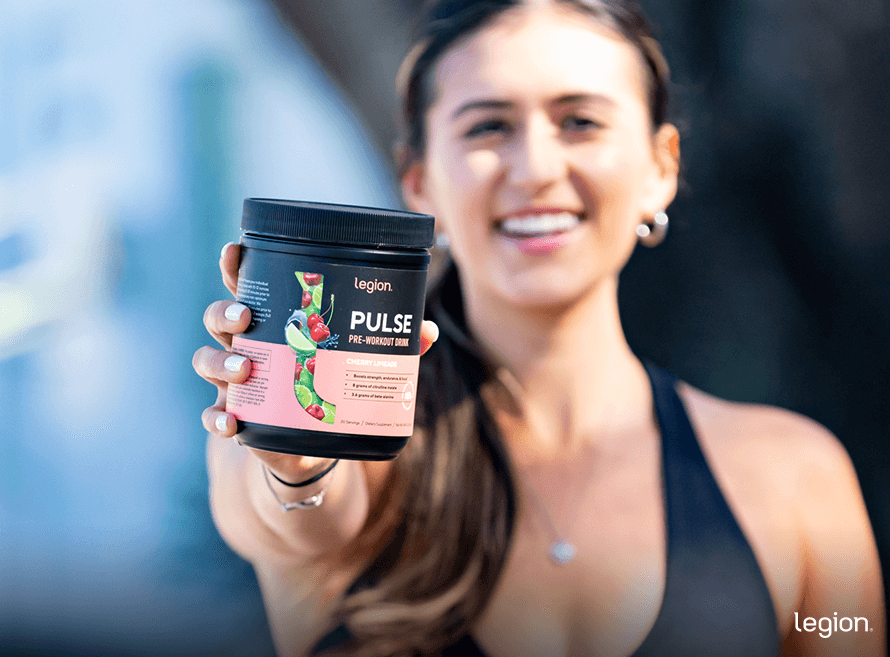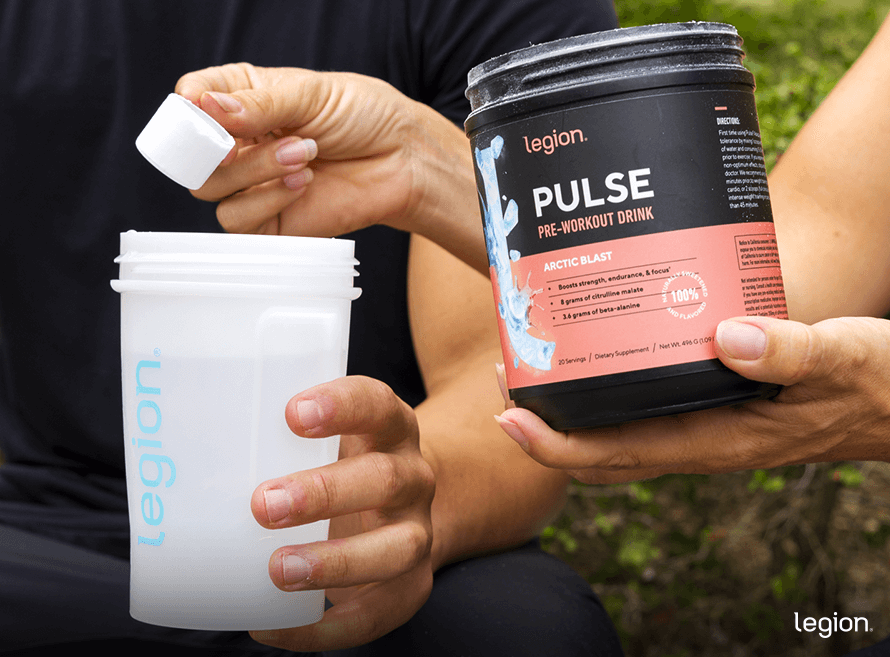
Pre-workout has a reputation problem.
Scroll through TikTok or Reddit and you’d think a single scoop can “spike your blood pressure,” “overload your heart,” and “cause heart attacks in young people.”
It’s a dramatic story—scary, viral, and completely misleading for most.
Here’s the truth: if you’re healthy, buy from reputable brands, and follow the label, pre-workout is a low-risk supplement.
The real issues show up when people already have heart or blood pressure problems, use sketchy formulas, or treat pre-workout like an all-you-can-scoop buffet.
In this article, you’ll learn what the research actually says about pre-workout and heart health—the good, the bad, and the stuff the internet always leaves out.
Key Takeaways
- For healthy, active people who follow the label, pre-workout isn’t bad for your heart. Studies show it doesn’t cause harmful changes in blood pressure, heart rate, or other health markers.
- Most common pre-workout ingredients are safe for your heart at normal doses. Caffeine only raises blood pressure and heart rate a little for a short time, and ingredients like creatine, beta-alanine, citrulline, taurine, and betaine are generally considered heart-friendly.
- Pre-workout can briefly raise your blood pressure and heart rate, but in healthy people these changes stay within normal limits and aren’t considered dangerous.
- Avoid stimulant-based pre-workout if you have high blood pressure, heart issues, are sensitive to stimulants, pregnant, or breastfeeding, or take medications that don’t mix well with stimulants.
- Non-stim pre-workout is safe for your heart only if it truly contains no stimulants. Some “caffeine-free” or “stim-free” products still include hidden stimulants, so choose reputable, third-party-tested brands.
Table of Contents
+
Is Pre-Workout Bad for Your Heart?

For healthy, active people who take the amount the label recommends, research says no—pre-workout isn’t bad for your heart. In fact, in some cases, it may even nudge certain risk markers in a better direction.
For example, in a study by Georgia Southern University, active men took a pre-workout daily while weight training. Their resting heart rate and blood pressure stayed in the normal range or even drifted slightly downward on average.
A similar study in active women tested up to two servings of pre-workout per day and found no abnormal changes in heart rate, blood pressure, or other health markers.
Another 4-week trial on pre-workout found the same thing: nothing in the participants’ bloodwork suggested stress on the heart.
In other words, if you’re healthy, exercise regularly, and stick to recommended serving sizes, the current evidence doesn’t suggest that pre-workout is dangerous for your heart.
How Does Pre-Workout Affect Your Heart?
Here’s how the most common pre-workout ingredients impact heart health:
Caffeine
Caffeine is the ingredient most people think will stress their heart, but the research doesn’t back that up for healthy adults using normal amounts.
Studies show that moderate daily caffeine intake—about what you’d get from one serving of pre-workout plus a cup of coffee—is actually linked to a lower risk of heart disease, not a higher one. And in the doses found in most pre-workouts, caffeine doesn’t consistently raise resting heart rate or change other heart measures in any meaningful way.
When caffeine is combined with common pre-workout ingredients like beta-alanine or creatine, research shows it still doesn’t cause heart issues when taken as directed.
You may see a small, temporary bump in blood pressure after you take a caffeinated pre-workout—usually just a few points—but this is normal and expected. For healthy people, it isn’t dangerous.
If you already have high blood pressure or heart problems, though, this is something you should talk to your doctor about.
For everyone else, caffeine is safe, as long as your total daily intake stays reasonable and you’re not stacking energy drinks, coffee, and pre-workout all at once.
Creatine
Creatine is one of the safest and most well-studied supplements in the world, and there’s no evidence that normal doses harm your heart.
In fact, research shows the opposite: creatine helps your cells make and use energy more efficiently, including the cells in your heart. Some studies even suggest it may help protect heart muscle by reducing oxidative stress.
So if you see creatine in your pre-workout, that’s not something to worry about. If anything, it’s one of the ingredients with the cleanest safety profile.
Synephrine
Research on synephrine shows that most reported problems come from very high doses or from people taking it alongside multiple other stimulants.
A review of 30 case reports (investigating 35 patients in total) found that symptoms such as chest pain, palpitations, dizziness, and fainting were linked to supplements that combined synephrine with high-doses of caffeine, guarana, yohimbine, deterenol combined with theophylline, or beta-phenylethylamine.
That said, synephrine’s more significant cardiovascular effects only tend to appear at doses above 100 mg, and some research suggests that synephrine by itself doesn’t raise blood pressure in healthy adults.
Put simply, synephrine may become a concern when people take very large doses or stack it with other strong stimulants. At normal, label-recommended amounts, research doesn’t show the same risks in healthy, active people.
Beta-Alanine
Beta-alanine doesn’t appear to cause negative cardiovascular effects in healthy people at normal doses. In fact, it may offer indirect heart benefits because carnosine—the compound it helps increase—has antioxidant and anti-inflammatory properties.
The main side effect of beta-alanine is itchy skin (paresthesia), which can feel strange, but it isn’t dangerous and doesn’t affect your heart.
L-Citrulline and L-Arginine
L-citrulline and L-arginine are common “nitric oxide boosters” in pre-workout. They help your body produce more nitric oxide, which relaxes blood vessels and improves blood flow. Nitric oxide also supports heart health by helping regulate blood pressure and keeping blood vessels functioning smoothly.
Because of this, citrulline and arginine are generally considered heart-friendly ingredients, and there’s no evidence they harm the cardiovascular system when used in normal supplemental doses.
Taurine
Taurine is an amino acid found in many energy drinks and some pre-workouts. It helps regulate fluid balance, calcium levels in cells, and blood pressure, and it also acts as an antioxidant.
Taurine is important for normal heart contraction, and some research links it to protective effects against coronary heart disease. While very high doses may raise cholesterol in some people, taurine has generally been viewed as heart-supportive, not harmful, when used in normal supplemental amounts.
Betaine
Betaine is sometimes included in pre-workout because it may support power output, but it also has some interesting heart-related effects. A large review found that betaine can help improve several cardiovascular risk markers, including total cholesterol, LDL cholesterol, and homocysteine.
Just as important, it did not raise blood pressure or negatively affect triglycerides, HDL, blood sugar, inflammation markers, or liver enzymes.
Does Pre-Workout Increase Blood Pressure or Heart Rate (and for How Long)?

If your pre-workout contains stimulants, you’ll almost always see a small, temporary rise in blood pressure and heart rate.
This is normal.
Research shows caffeine alone can bump systolic blood pressure by about 3–15 mmHg, diastolic by 4–13 mmHg, and slightly raise heart rate. These effects usually start around 30 minutes after you consume caffeine, peak at 1–2 hours after, and may last for 4+ hours.
Synephrine can do something similar. In one study that used a higher dose than most products provide, systolic blood pressure rose by about 7 mmHg and heart rate by about 4 bpm for up to 5 hours.
Importantly, the changes seen in these studies stayed within normal ranges for healthy people and aren’t considered harmful unless you already have high blood pressure or heart problems.
Who Should Avoid Pre-Workout?
Most healthy, active adults can use pre-workout safely, but some people should be more cautious—or avoid stimulant-based formulas altogether.
Skip pre-workout (or choose a non-stim version) if you:
- Have high blood pressure or a heart condition
- Are very sensitive to caffeine or other stimulants
- Are pregnant or breastfeeding
- Take medications that don’t mix well with stimulants (your doctor can tell you)
- Regularly experience anxiety or panic symptoms that caffeine can worsen
Even if you don’t fall into these groups, it’s still smart to start with a half serving to see how your body responds, especially if you don’t normally use caffeine.
How to Stay Safe While Taking Pre-Workout

Here are a few basic tips to help keep you safe while taking pre-workout:
Dosing and Preparation
Always follow the serving instructions on the label. And don’t dry scoop your pre-workout—it doesn’t hit harder, and it only increases the risk of choking or accidentally taking too much at once.
Daily Limit
Stick to one serving per day, unless the label clearly says otherwise.
For caffeine, stay below 6 mg per kilogram of body weight per day from all sources—pre-workout, coffee, energy drinks, soda, tea, and so on. This keeps your “total stimulant load” in the safe zone.
Third-Party Testing
Choose brands that use independent, third-party testing to verify ingredient purity and dosing accuracy. Research shows that supplements without this testing are more likely to contain undeclared ingredients or the wrong amounts of what’s listed.
And when you take products with inaccurate labels, you’re far more likely to run into heart-related issues.
Hydration
Pre-workout itself doesn’t dehydrate you. But it can help you train harder and longer, which means you may sweat more. If you don’t replace the extra fluid you lose, your heart ends up working harder than it needs to.
Fix this by drinking water before, during, and after training, and using electrolytes during long or very sweaty workouts.
Is Non-Stim Pre-Workout Bad for Your Heart?
A true non-stim pre-workout—one with zero stimulants—isn’t bad for your heart. These formulas rely on ingredients like citrulline, beta-alanine, and betaine, which don’t negatively impact your cardiovascular health.
That said, there’s a growing number of products marketed as “stimulant-free” or “caffeine-free” that aren’t actually free of stimulants. In many cases, these products remove caffeine, but add other, lesser-known stimulants like synephrine, yohimbine, hordenine, or theacrine.
These can still raise blood pressure and heart rate—and because they’re less regulated and often mislabeled, the risks can be higher than with normal, well-dosed caffeine.
So non-stim pre-workout is perfectly safe for your heart as long as it’s truly non-stim. To stay safe, choose products from reputable brands that:
- Fully disclose every ingredient and dose
- Avoid “proprietary blends”
- Use third-party testing to confirm purity and accuracy
- Don’t hide stimulants behind plant extracts with unfamiliar names
The Bottom Line on Whether Pre-Workout Is Bad for Your Heart
For healthy, active people using normal, label-recommended doses, the evidence is clear: pre-workout isn’t bad for your heart.
This changes if you take far too much, mix multiple stimulant-heavy products, or use pre-workout despite already having high blood pressure or other heart issues.
When used as directed, pre-workout causes nothing more than a small, temporary rise in blood pressure and heart rate—something your body naturally experiences during exercise anyway.
So if you’re healthy, train regularly, and stick to reputable brands and normal doses, pre-workout is not the heart-destroying supplement the some parts of the internet make it out to be.
FAQ #1: Can pre-workout cause a heart attack?
For healthy people using normal doses, pre-workout is not known to cause heart attacks. The cases you hear about almost always involve overdosing, mixing multiple stimulant-heavy products, or people with undiagnosed heart conditions.
If you follow the label and you’re generally healthy, the risk is low.
FAQ #2: Does pre-workout increase heart rate?
Yes, but only a little, and only for a short time. Stimulants like caffeine naturally raise heart rate by a couple of beats per minute for a few hours. This is normal and not harmful for healthy adults. If you have heart issues or are sensitive to stimulants, you should be more cautious.
FAQ #3: Is taking pre-workout every day bad for your heart?
Not for healthy adults using normal, label-recommended amounts. Multiple studies show no harmful changes in heart rate, blood pressure, or other health markers with daily use. Real problems only show up when people take more than they should or already have heart issues.
FAQ #4: Can I take pre-workout with high blood pressure?
If you have high blood pressure—even if it’s controlled—you should talk to your doctor before using any stimulant-based pre-workout. Stimulants can cause a small, temporary rise in blood pressure. A true non-stim pre-workout is usually the safer option in this scenario.
FAQ #5: Is caffeine before a workout bad for your heart?
For most healthy adults, no. But if you have high blood pressure, heart problems, or extreme caffeine sensitivity, you should be cautious or choose a non-stim formula.
Want More Content Like This?
Check out these articles:
- How Long Does Pre-Workout Last? Science Explained
- Does Pre-Workout Cause Acne? What Science Says
- How Long Does Pre-Workout Take to Kick In?
Scientific References +
- Bella, Yanesko Fernandes, et al. “Pre-Workout Supplements and Their Effects on Cardiovascular Health: An Integrative Review.” Journal of Cardiovascular Development and Disease, vol. 12, no. 4, 24 Mar. 2025, p. 112, https://doi.org/10.3390/jcdd12040112.
- Kendall, Kristina L., et al. “Ingesting a Preworkout Supplement Containing Caffeine, Creatine, β-Alanine, Amino Acids, and B Vitamins for 28 Days Is Both Safe and Efficacious in Recreationally Active Men.” Nutrition Research, vol. 34, no. 5, 1 May 2014, pp. 442–449, www.sciencedirect.com/science/article/pii/S027153171400058X?casa_token=OgKhq3l5fU8AAAAA:UR3AH43dtNPXYY3sLKOmi2zI32GfNCCaDdnVKNoz_2XxbY9rRF3Ib-TltxO3IuEx7yzN4EJV, https://doi.org/10.1016/j.nutres.2014.04.003.
- Vogel, Roxanne M, et al. “Safety of a Dose-Escalated Pre-Workout Supplement in Recreationally Active Females.” Journal of the International Society of Sports Nutrition, vol. 12, no. 1, 2015, p. 12, https://doi.org/10.1186/s12970-015-0074-y. Accessed 11 Nov. 2019.
- Shelmadine, Brian, et al. “Effects of 28 Days of Resistance Exercise and Consuming a Commercially Available Pre-Workout Supplement, NO-Shotgun®, on Body Composition, Muscle Strength and Mass, Markers of Satellite Cell Activation, and Clinical Safety Markers in Males.” Journal of the International Society of Sports Nutrition, vol. 6, no. 1, 2009, p. 16, https://doi.org/10.1186/1550-2783-6-16. Accessed 19 Jan. 2020.
- Turnbull, Duncan, et al. “Caffeine and Cardiovascular Health.” Regulatory Toxicology and Pharmacology, vol. 89, no. 1, Oct. 2017, pp. 165–185, https://doi.org/10.1016/j.yrtph.2017.07.025.
- Martos-Arregui, Antonio, et al. “Comparative Effects of Caffeine, Beta-Alanine, and Their Combination on Mechanical, Physiological, and Perceptual Responses to Upper-Body Superset Resistance Training.” European Journal of Applied Physiology, 22 Oct. 2024, https://doi.org/10.1007/s00421-024-05639-4. Accessed 11 Apr. 2025.
- Kedia, A. William, et al. “Effects of a Pre-Workout Supplement on Lean Mass, Muscular Performance, Subjective Workout Experience and Biomarkers of Safety.” International Journal of Medical Sciences, vol. 11, no. 2, 2014, pp. 116–126, https://doi.org/10.7150/ijms.7073.
- Balestrino, Maurizio. “Role of Creatine in the Heart: Health and Disease.” Nutrients, vol. 13, no. 4, 7 Apr. 2021, p. 1215, mdpi-res.com/nutrients/nutrients-13-01215/article_deploy/nutrients-13-01215.pdf, https://doi.org/10.3390/nu13041215.
- de Jonge, M. L. L., et al. “Review of Case Reports on Adverse Events Related to Pre-Workout Supplements Containing Synephrine.” Cardiovascular Toxicology, vol. 23, no. 1, Jan. 2023, pp. 1–9, https://doi.org/10.1007/s12012-022-09777-z. Accessed 5 Feb. 2023.
- Shara, Mohd, et al. “Safety Evaluation of P -Synephrine Following 15 Days of Oral Administration to Healthy Subjects: A Clinical Study.” Phytotherapy Research, vol. 32, no. 1, 12 Nov. 2017, pp. 125–131, https://doi.org/10.1002/ptr.5956. Accessed 2 Aug. 2020.
- McCarty, Mark F, and James J DiNicolantonio. “β-Alanine and Orotate as Supplements for Cardiac Protection.” Open Heart, vol. 1, no. 1, Aug. 2014, p. e000119, https://doi.org/10.1136/openhrt-2014-000119. Accessed 14 Nov. 2019.
- Bloomer, Richard J, et al. “Comparison of Pre-Workout Nitric Oxide Stimulating Dietary Supplements on Skeletal Muscle Oxygen Saturation, Blood Nitrate/Nitrite, Lipid Peroxidation, and Upper Body Exercise Performance in Resistance Trained Men.” Journal of the International Society of Sports Nutrition, vol. 7, no. 1, 6 May 2010, https://doi.org/10.1186/1550-2783-7-16. Accessed 8 July 2020.
- Naseem, Khalid M. “The Role of Nitric Oxide in Cardiovascular Diseases.” Molecular Aspects of Medicine, vol. 26, no. 1-2, 2005, pp. 33–65, www.ncbi.nlm.nih.gov/pubmed/15722114, https://doi.org/10.1016/j.mam.2004.09.003.
- Jong, Chian Ju, et al. “The Role of Taurine in Mitochondria Health: More than Just an Antioxidant.” Molecules, vol. 26, no. 16, 13 Aug. 2021, p. 4913, https://doi.org/10.3390/molecules26164913. Accessed 28 Oct. 2021.
- Schaffer, S W, et al. “Regulation of Calcium Homeostasis in the Heart by Taurine.” Federation Proceedings, vol. 39, no. 9, July 1980, pp. 2691–4, pubmed.ncbi.nlm.nih.gov/7398899/.
- Chih-Chen Tzang, et al. “Insights into the Cardiovascular Benefits of Taurine: A Systematic Review and Meta-Analysis.” Nutrition Journal, vol. 23, no. 1, 15 Aug. 2024, https://doi.org/10.1186/s12937-024-00995-5. Accessed 11 Nov. 2024.
- Ashtary-Larky, Damoon, et al. “Effects of Betaine Supplementation on Cardiovascular Markers: A Systematic Review and Meta-Analysis.” Critical Reviews in Food Science and Nutrition, 25 Mar. 2021, pp. 1–18, https://doi.org/10.1080/10408398.2021.1902938. Accessed 10 Apr. 2022.
- Mort, Jane R, and Heather R Kruse. “Timing of Blood Pressure Measurement Related to Caffeine Consumption.” Annals of Pharmacotherapy, vol. 42, no. 1, Jan. 2008, pp. 105–110, https://doi.org/10.1345/aph.1k337.
- Bui, Linda T, et al. “Blood Pressure and Heart Rate Effects Following a Single Dose of Bitter Orange.” Annals of Pharmacotherapy, vol. 40, no. 1, Jan. 2006, pp. 53–57, https://doi.org/10.1345/aph.1g488. Accessed 27 Nov. 2022.
- Guest, Nanci S., et al. “International Society of Sports Nutrition Position Stand: Caffeine and Exercise Performance.” Journal of the International Society of Sports Nutrition, vol. 18, no. 1, 2 Jan. 2021, jissn.biomedcentral.com/articles/10.1186/s12970-020-00383-4, https://doi.org/10.1186/s12970-020-00383-4.
- Harty, Patrick S., et al. “Multi-Ingredient Pre-Workout Supplements, Safety Implications, and Performance Outcomes: A Brief Review.” Journal of the International Society of Sports Nutrition, vol. 15, no. 1, 8 Aug. 2018, jissn.biomedcentral.com/articles/10.1186/s12970-018-0247-6, https://doi.org/10.1186/s12970-018-0247-6.










